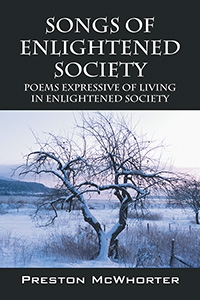
Songs of Enlightened Society
Poems Expressive of Living in Enlightened Society
The foundations of enlightenment shine through in this collection.
The second poetry collection written by archaeologist and retiree Preston McWhorter, Songs of Enlightened Society takes readers on the author’s spiritual journey studying Vajrayana Buddhism, which stresses the power of the mind and the impact one individual striving for enlightenment can have on both his society and the world. It’s a practice that encourages people to experience the “sacredness” and “nowness” of life, accepting that even harsh realities like massacre and rape—which McWhorter tackles—can nurture our existence.
While most of the poems provide guidance and lessons on how an enlightened society can develop, some also reveal McWhorter’s extremely personal struggles. “Wangthang (Authentic Presence),” for example, shows not just his struggles with bipolar disorder and side effects like “painful erection / Trying to escape intense pain” from the medications prescribed to manage the condition.
Broken into four sections, the collection provides a broad overview of McWhorter’s Buddhist experience, showing through poems like “A Divine Madness,” “Basic Goodness Is,” and “The Journey to Fearlessness,” the foundations he believes are needed to enlighten society. Poems in the final section express feelings about living in an enlightened society that, according to “Enlightened Society: A Meditative Sonnet,” would include cooperative people with full, loving hearts rather than those who “compete, want instant pleasure, distrust” and with no “rat heresy … No rat race!”
McWhorter states in his author bio that he’s been writing poetry for roughly a decade but only seriously since January 2013. His desire for a better, more meaningful world is evident. However, including fewer poems, more carefully selected, would have helped his stronger and more powerful pieces, like “White Tara,” stand out. It’s the simple, but image-full, language that makes “White Tara” and its narrator’s plea to the Buddhist goddess so strong: ““Tara! Radiant, beautiful, youthful / Compassionate, motherly, protectress / May life be long enough to be useful / In ending this dark era of the stranger.”
There’s a lot of repetition in Songs of Enlightened Society, both in theme and phrasing. A mix of rhymed lines, sonnets, and free verse creates the varied and rhythmic songs the title promises. But sometimes the messages of the poems get lost in extra words, random bold type, and misplaced punctuation. It’s also unclear why some pieces are written in all caps, which, more importantly than suggesting shouting, can be extremely difficult to read.
These faults, however, should not deter a reader—especially one on his or her own spiritual journey—from picking up Songs of Enlightened Society. All those who believe in what people’s individual and collective mindsets can achieve will find a kindred spirit in McWhorter.
Reviewed by
Cindy Wolfe Boyton
Disclosure: This article is not an endorsement, but a review. The publisher of this book provided free copies of the book and paid a small fee to have their book reviewed by a professional reviewer. Foreword Reviews and Clarion Reviews make no guarantee that the publisher will receive a positive review. Foreword Magazine, Inc. is disclosing this in accordance with the Federal Trade Commission’s 16 CFR, Part 255.
